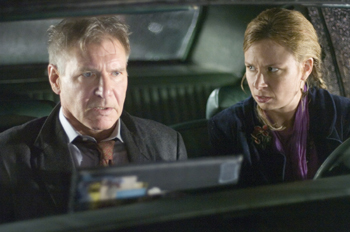![[Metroactive Movies]](/movies/gifs/movies468.gif)
[ Movies Index | Show Times | Silicon Valley | Metroactive Home | Archives ]
Car Jacking: Jack Stanfield (Harrison Ford) is no Jack Bauer, as Janet (Mary Lynn Rajskub, Chloe from '24') learns in 'Firewall.'
Computer Lust
At last, Harrison Ford's 'Firewall' gives IT guys the movie they've been dying for
By Richard von Busack
THERE IS no easier way for a director to winch up suspense than by staging a home invasion. With little effort, one can really make an audience's stomach ache, as if they were trapped on an over-enthusiastic Tilt-a-Whirl. And yet Firewall, which is at least half home invasion, still can't rouse up a pulse worthy of the amped-up music by Alexandre Desplat.
At Seattle's fictitious Landrock Pacific Bank, Jack Stanfield (Harrison Ford) is the vice president of network security. He dwells in a home on Puget Sound designed by his wife, Beth (Virginia Madsen), an architect. They have two children, a boy and a girl, both slightly oblivious to the world outside their electronic toys.
The bank is in midmerger. The always sneering Robert Patrick plays the new boss; the menschier Alan Arkin plays the company's old man. Stanfield's irritation at working for Patrick's character is overcome by more urgent trouble. A debt collector turns up claiming that Jack owes $95,000 in online-gambling debts. Then a supposed government man calling himself Cox (Paul Bettany) forces himself into Jack's office. Simultaneously, Jack's family is taken hostage by a squad of thugs disguised as pizza deliverers.
Cox demands $100 million, to be taken by wire transfer from the accounts of 1,000 of Landrock's wealthiest customers. To make sure there are no slip-ups, Cox's gang has rewired the executive's house with monitors and cell phones so that he's never out of their sight.
As Cox, Bettany threatens to add a dash of humor to the film. When Cox tells Jack he'll be free to return soon and "chase the American dream," it's supposed to be a joke. Presumably, the line isn't there to make us hate him more for being foreign.
Bettany uses a posh edge to his English rotter's voice. He has about half a foot of height on Jack and looks young and fit enough to beat him good. There is justice in seeing a banker lose sleep (usually they make us lose sleep). But Firewall is so square that we're never allowed to be on the crafty thief's side.
The script doesn't throw the women a bone, either. Madsen's Beth and her teenage daughter (Carly Schroeder) spend the movie with their mouths taped shut. And Jack has an adoring secretary, Janet (Mary Lynn Rajskub, the ineffable Chloe from 24), who forgives Jack for firing her. She has been an executive secretary for a long time, but she lives in a serious dump of an apartment.
Yet there are no repercussions when Jack comes back to beg for her help. She trusts him implicitly. Incidentally, Bobbie, a boy trying to court her (Matthew Currie Holmes) is the first of what will be many out-of-nowhere Christian characters shoehorned into a Hollywood movie. He is a gospel-rock musician who has "What a Friend We Have in Jesus" programmed into his cell phone.
Cell phones are essential to the plot. So are an MP3 player in one scene and an iPod in the next, in order to be nonsectarian. The film comes out for PCs eventually. Firewall begs for a drinking game: hoist a round every time the Dell logo appears.
Richard Loncraine is an older director glomming onto a younger style. In the production notes, he says, "We shot it all on DV cameras and video, high 8 and 8mm so it has an unprofessional look—in fact we did it as badly as we could. Nobody directed it. I wanted jerky frames, blurriness, crash zooms and audio that sounded like tapped phone lines."
Far from creating a film torn from today's podcasts, Loncraine's film has that flatness you can always expect from people easily wowed by technology. I mean the kind of filmmakers who would argue that the last Batman movie would have been more compelling if it had been all about the Batphone.
Ford's character seems under duress, as if he can't wait to end this ordeal so he can get back to work programming his computers. His moroseness builds up to the punishing last reel, where the family dog (he is called "Rusty," unironically even) saves the day.
Ford combines the insouciance of a '70s movie star with the hard-rock durability of a '40s action hero. It's the appeal to young men and old that has reputedly made him the wealthiest male movie star who ever lived. Possibly, Ford has never endured such an uninteresting role. There is none of the air of slouchiness and scruffiness that make him easy to take when he plays a king of this world.
When Ford played a doctor whose wife was vanished in Roman Polanksi's Frantic, there was an element of wish-fulfillment in the fantasy: he was suddenly cut loose from a medical convention to look for kidnappers in Paris.
Here, Ford hangs tough and gruff until the finale, where he is thrown through windows and splintery boards. Loncraine makes this scene hurt without making it hurt good. It is a creaky cowboy-saloon brawl stretched into agony. Watching an older actor get slammed around is graceless and unedifying.
You can understand Ford's sour, morose quality throughout this movie. Watching him seethe is like spending an hour and a half in the company of Dick Cheney.
[ Silicon Valley | Metroactive Home | Archives ]
![]()

Photograph by Diyah Pera
Firewall (PG-13; 120 min.), directed by Richard Loncraine, written by Joe Forte, photographed by Marco Pontecorvo and starring Harrison Ford and Paul Bettany, opens Friday valleywide.
Send a letter to the editor about this story to letters@metronews.com.
From the February 8-14, 2006 issue of Metro, Silicon Valley's Weekly Newspaper.